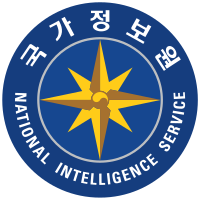
Back خدمة الاستخبارات الوطنية Arabic Národní zpravodajská služba (Jižní Korea) Czech National Intelligence Service (Südkorea) German Servicio de Inteligencia Nacional (Corea del Sur) Spanish سرویس اطلاعات ملی (کره جنوبی) Persian National Intelligence Service (Corée) French שירות הביון הלאומי (קוריאה הדרומית) HE Badan Intelijen Nasional (Korea Selatan) ID National Intelligence Service Italian 大韓民国国家情報院 Japanese
| 국가정보원 國家情報院 | |
 | |
| Agency overview | |
|---|---|
| Formed | 13 June 1961 |
| Preceding agencies |
|
| Type | Independent |
| Jurisdiction | Government of South Korea |
| Headquarters | Naegok-dong, Seocho District, Seoul |
| Motto | We serve in the shadows to light the way forward (1961) |
| Employees | Classified |
| Annual budget | Classified |
| Minister responsible |
|
| Agency executives |
|
| Parent agency | President of South Korea |
| Website | Official website |
The National Intelligence Service (NIS; Korean: 국가정보원, 국정원; Hanja: 國家情報院, 國情院; RR: Gukga Jeongbowon, Gukjeongwon; MR: Kukka Chŏngbowŏn, Kukchŏngwŏn) is the chief intelligence agency of South Korea. The agency was officially established in 1961 as the Korean Central Intelligence Agency (KCIA; Korean: 중앙정보부; Hanja: 中央情報部; RR: Jung’angjeongbobu; MR: Chung’angchŏngpopu), during the rule of general Park Chung Hee’s military Supreme Council for National Reconstruction, which displaced the Second Republic of Korea. The original duties of the KCIA were to supervise and coordinate both international and domestic intelligence activities and criminal investigations by all government intelligence agencies, including that of the military. The agency’s broad powers allowed it to actively intervene in politics. Agents undergo years of training and checks before they are officially inducted and receive their first assignments.
The agency took on the name Agency for National Security Planning (ANSP; Korean: 국가안전기획부, 안기부; Hanja: 國家安全規劃部, 安企部) in 1981, as part of a series of reforms instituted by the Fifth Republic of Korea under President Chun Doo-hwan. Besides trying to acquire intelligence on North Korea and suppress South Korean activists, the ANSP, like its predecessor, was heavily involved in activities outside its sphere, including domestic politics and promoting the 1988 Summer Olympics. During its existence, the ANSP engaged in numerous cases of human rights abuse such as torture,[1] as well as election tampering.[2]
In 1999, the agency assumed its current name. The more democratic and current Sixth Republic of Korea has seen a significant reduction in the role of the NIS in response to public criticisms about past abuses.
- ^ Jang, Ye-ji (19 June 2020). "Former ANSP investigator sentenced to prison for falsely testifying about torture of labor activist". The Hankyoreh. Hankyoreh. The Hankyoreh (English). Retrieved 29 September 2022.
- ^ Saxer, Carl (Spring 2004). "Generals and Presidents: Establishing Civilian and Democratic Control in South Korea". Armed Forces & Society. 30 (3): 383–408. doi:10.1177/0095327X0403000304. JSTOR 48608696. S2CID 154216807. Retrieved 29 September 2022.
© MMXXIII Rich X Search. We shall prevail. All rights reserved. Rich X Search